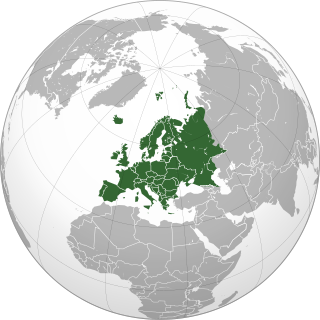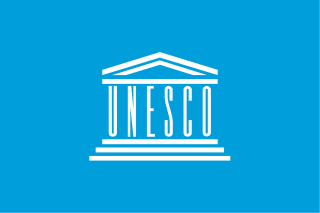Related Research Articles

Albania, officially the Republic of Albania, is a country in Southeast Europe. It is in the Balkans, on the Adriatic and Ionian Seas within the Mediterranean Sea, and shares land borders with Montenegro to the northwest, Kosovo to the northeast, North Macedonia to the east and Greece to the south. Spanning an area of 28,748 km2 (11,100 sq mi), it has a varied range of climatic, geological, hydrological and morphological conditions. Albania's landscapes range from rugged snow-capped mountains in the Albanian Alps and the Korab, Skanderbeg, Pindus and Ceraunian Mountains, to fertile lowland plains extending from the Adriatic and Ionian seacoasts. Tirana is the capital and largest city in the country, followed by Durrës, Vlorë, and Shkodër.

The Balkans, corresponding partially with the Balkan Peninsula, is a geographical area in southeastern Europe with various geographical and historical definitions. The region takes its name from the Balkan Mountains that stretch throughout the whole of Bulgaria. The Balkan Peninsula is bordered by the Adriatic Sea in the northwest, the Ionian Sea in the southwest, the Aegean Sea in the south, the Turkish straits in the east, and the Black Sea in the northeast. The northern border of the peninsula is variously defined. The highest point of the Balkans is Musala, 2,925 metres (9,596 ft), in the Rila mountain range, Bulgaria.

Europe is a continent located entirely in the Northern Hemisphere and mostly in the Eastern Hemisphere. It is bordered by the Arctic Ocean to the north, the Atlantic Ocean to the west, the Mediterranean Sea to the south, and Asia to the east. Europe shares the landmass of Eurasia with Asia, and of Afro-Eurasia with both Asia and Africa. Europe is commonly considered to be separated from Asia by the watershed of the Ural Mountains, the Ural River, the Caspian Sea, the Greater Caucasus, the Black Sea, and the waterway of the Bosporus Strait.

Kosovo, officially the Republic of Kosovo, is a country in Southeast Europe with partial diplomatic recognition. Kosovo lies landlocked in the centre of the Balkans, bordered by Serbia to the north and east, North Macedonia to the southeast, Albania to the southwest, and Montenegro to the west. Most of central Kosovo sits on the plains of Metohija and the Kosovo field. The Accursed Mountains and Šar Mountains rise in the southwest and southeast, respectively. Kosovo's capital and largest city is Pristina.

The North Atlantic Treaty Organization, also called the North Atlantic Alliance, is an intergovernmental military alliance of 32 member states—30 European and 2 North American. Established in the aftermath of World War II, the organization implements the North Atlantic Treaty, signed in Washington, D.C., on 4 April 1949. NATO is a collective security system: its independent member states agree to defend each other against attacks by third parties. During the Cold War, NATO operated as a check on the threat posed by the Soviet Union. The alliance remained in place after the dissolution of the Soviet Union and the Warsaw Pact, and has been involved in military operations in the Balkans, the Middle East, South Asia and Africa. The organization's motto is animus in consulendo liber. The organization's strategic concepts include deterrence.

Eastern Europe is a subregion of the European continent. As a largely ambiguous term, it has a wide range of geopolitical, geographical, ethnic, cultural, and socio-economic connotations. Its eastern boundary is marked by the Ural Mountains, whilst its western boundary is defined in various ways. Most definitions include the countries of Belarus, Russia, Ukraine, Moldova and Romania while less restrictive definitions may also include some or all of the Balkans, the Baltic states, the Caucasus and the Visegrád group.

The European Bank for Reconstruction and Development is an international financial institution founded in 1991. As a multilateral developmental investment bank, the EBRD uses investment as a tool to build market economies.

The Euro-Atlantic Partnership Council (EAPC) is a post–Cold War, North Atlantic Treaty Organization (NATO) institution. The EAPC is a multilateral forum created to improve relations between NATO and non-NATO countries in Europe and Central Asia. States meet to cooperate and discuss political and security issues. It was formed on 29 May 1997 at a Ministers’ meeting held in Sintra, Portugal, as the successor to the North Atlantic Cooperation Council (NACC), which was created in 1991.
AIESEC is an international "youth-run" and led, non-governmental and not-for-profit organization that provides young people with business development internships. The organization focuses on empowering young people to make a progressive social impact. The AIESEC network includes approximately 40,000 members in 120+ countries.

The European Union (EU) has expanded a number of times throughout its history by way of the accession of new member states to the Union. To join the EU, a state needs to fulfil economic and political conditions called the Copenhagen criteria, which require a stable democratic government that respects the rule of law, and its corresponding freedoms and institutions. According to the Maastricht Treaty, each current member state and the European Parliament must agree to any enlargement. The process of enlargement is sometimes referred to as European integration. This term is also used to refer to the intensification of co-operation between EU member states as national governments allow for the gradual harmonisation of national laws.
The Intergovernmental Oceanographic Commission of UNESCO (IOC/UNESCO) was established by resolution 2.31 adopted by the General Conference of the United Nations Educational, Scientific and Cultural Organization (UNESCO). It first met in Paris at UNESCO Headquarters from 19 to 27 October 1961. Initially, 40 States became members of the commission. The IOC assists governments to address their individual and collective ocean and coastal management needs, through the sharing of knowledge, information and technology as well as through the co-ordination of programs and building capacity in ocean and coastal research, observations and services.

Freedom of information is freedom of a person or people to publish and consume information. Access to information is the ability for an individual to seek, receive and impart information effectively. This sometimes includes "scientific, indigenous, and traditional knowledge; freedom of information, building of open knowledge resources, including open Internet and open standards, and open access and availability of data; preservation of digital heritage; respect for cultural and linguistic diversity, such as fostering access to local content in accessible languages; quality education for all, including lifelong and e-learning; diffusion of new media and information literacy and skills, and social inclusion online, including addressing inequalities based on skills, education, gender, age, race, ethnicity, and accessibility by those with disabilities; and the development of connectivity and affordable ICTs, including mobile, the Internet, and broadband infrastructures".
The New World Information and Communication Order is a term coined in a debate over media representations of the developing world in UNESCO in the late 1970s early 1980s. The NWICO movement was part of a broader effort to formally tackle global economic inequality that was viewed as a legacy of imperialism upon the global south.
The World Summit Awards (WSA) rewards Information and Communications Technologies projects that have a positive impact on society at the local level. The award was initiated in 2003, within the framework of the United Nations World Summit on the Information Society. After the UN General Assembly adopted Resolution 56/183. The awards are open to companies, organizations, or individuals from any of the UN and the UNESCO Member States. They are divided into 8 different categories. The world summit awards are managed by the International Center for New Media (ICNM), a non-profit organization based in Salzburg, Austria. ICNM was founded by Peter A. Bruck, in 2002.

The World Federation of United Nations Associations (WFUNA) was founded in 1946 as a Federation of national associations. Its objectives are to promote the values of the UN Charter, defend multilateralism, work towards a better United Nations Organisation and raise awareness on the main pillars of work of the United Nations—peace and security, sustainable development, and human rights.

Turkey, officially the Republic of Türkiye, is a country mainly in Anatolia in West Asia, with a smaller part called East Thrace in Southeast Europe. It borders the Black Sea to the north; Georgia, Armenia, Azerbaijan, and Iran to the east; Iraq, Syria, and the Mediterranean Sea to the south; and the Aegean Sea, Greece, and Bulgaria to the west. Turkey is home to over 85 million people; most are ethnic Turks, while ethnic Kurds are the largest ethnic minority. Officially a secular state, Turkey has a Muslim-majority population. Ankara is Turkey's capital and second-largest city; Istanbul is its largest city, and its economic and financial center, as well as the largest city in Europe. Other major cities include İzmir, Bursa and Antalya.

The United Nations Educational, Scientific and Cultural Organization (UNESCO) is a specialized agency of the United Nations (UN) with the aim of promoting world peace and security through international cooperation in education, arts, sciences and culture. It has 194 member states and 12 associate members, as well as partners in the non-governmental, intergovernmental and private sector. Headquartered in Paris, France, UNESCO has 53 regional field offices and 199 national commissions.

UNESCO Global Geoparks (UGGp) are geoparks certified by the UNESCO Global Geoparks Council as meeting all the requirements for belonging to the Global Geoparks Network (GGN). The GGN is both a network of geoparks and the agency of the United Nations Educational, Scientific and Cultural Organization (UNESCO). that administers the network.

For a small country, Albania is characterised by a considerable wealth of terrestrial and marine ecosystems and habitats with contrasting floral, faunal, and fungal species, defined in an area of 28,748 square kilometres. Most of the country is predominantly of Mediterranean character, comprehending the country's center and south, while the alpine affinity is more visible in the northeast.

International Association of South-East European Studies, better known by its French language abbreviation AIESEE is an international scholarly, non-political and non-profit professional association focusing on Balkan studies and related fields of studies. The Association was established in Bucharest, capital of Romanian People's Republic, on 23 April 1963 and as of 2019 it brings together 25 member organizations in the field.
References
- ↑ "About National Commissions for UNESCO - | UNESCO.org". Portal.unesco.org. 2009-03-16. Retrieved 2013-05-23.
- 1 2 "Basic Texts" (PDF). UNESCO. Retrieved 2013-05-23.
- ↑ "About us". UNESCO Center for Peace. Archived from the original on 2018-09-05. Retrieved 2013-05-23.
- ↑ Bogdan C. Iacob (2020). "Southeast by Global South: The Balkans, UNESCO, and the Cold War". In James Mark; Artemy M. Kalinovsky; Steffi Margus (eds.). Alternative Globalizations: Eastern Europe and the Postcolonial World. Indiana University Press. pp. 251–270. ISBN 978-0-253-04650-5.